Today we analyze Gifts Ungiven, that has been reissued in Modern Masters. This wonderful card allows us to learn the notion of “search” and the situations where one may search and fail to find.
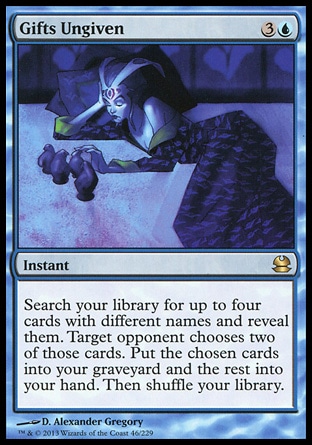
Oracle Text:
Instant
Search your library for up to four cards with different names and reveal them. Target opponent chooses two of those cards. Put the chosen cards into your graveyard and the rest into your hand. Then shuffle your library.
Before we start reading the text of our today’s card, I suggest I first illuminate the concept of searching for cards.
Search
“Searching is not finding.”
“A Clash of Kings” by George Martin
As with many other instructions on Magic cards, the “search” one doesn’t quite match its semantic meaning in the regular language. Even in terms of plain logic, “to search” is not really “to find”.
There are two different concepts of searching in Magic. In one case, you do not really have to find what you are searching for. In another, you are bound to find something. How do you tell these two cases from one another? It’s not that hard, you just have to comprehend what for and where you are searching.
Where? The key thing to understand here is whether the searched zone is open or hidden. In contemporary Magic we have seven zones: Library, Hand, Battlefield, Graveyard, Exile, Stack and Command zone. Some really old cards mention the Ante zone that is not used in any official events.
Open zones are those in which all players can see the faces of cards in them, excluding cards that are in them face down as a result of an effect. As such, open zones are Battlefield, Graveyard, Exile, Stack and Command zone.
Hidden zones are those in which not all players can see the faces of the cards. Library and Hand are hidden zones, and they remain such even if an effect reveals cards in them to all players (Telepathy).
Now if an effect instructs a player to search an open zone, the player is bound to find the object of this search, provided it is possible to find it. If a hidden zone is searched, multiple ways are possible, and for these we need to answer the what for question.
What for? If the player is searching a hidden zone, and is looking for cards with certain characteristic(s) at that, he or she is not bound to find any. If the effect instructs to just find a certain number of cards, he or she must find that many cards (or the possible maximum within that number, if the zone has less cards than required by that effect).
Extirpate’s effect instructs to search both an open zone (graveyard) and hidden zones (hand and liabrary). Cards with certain characteristics are searched for: all cards with certain name. That means, you are bound to find all such cards in the graveyard, and may fail to find cards in the hand and library even if they are there.
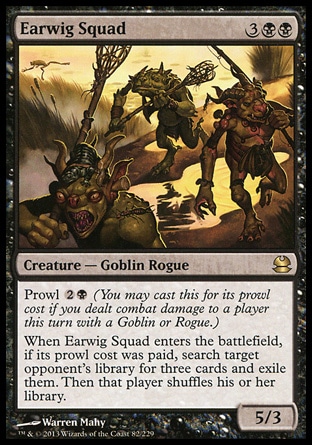
The effect of Earwig Squad’s triggered ability instructs to find any three cards without certain characteristics in a hidden zone (library). You must find three cards if there are at least three in that library. Otherwise, you just “find” all that are there.
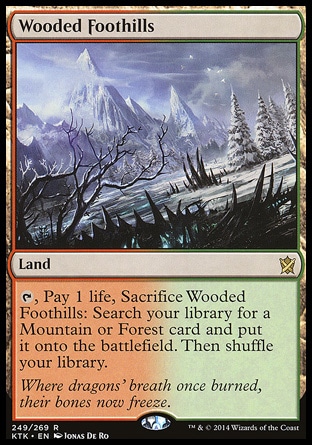
The effect of fetchlands instructs to search for cards with certain subtype (not name) in a hidden zone (library). It is therefore totally legal to “crack a fetchland” and fail to find anything. You must shuffle the deck no matter if you found any or not.
Finally, after you perform the search, you may need to reveal the found cards to all players. Usually, that necessity to reveal is printed on the card (it may also potentially appear behind ability keywords).
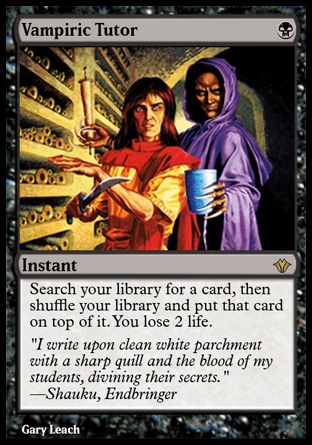
The effect of Vampiric Tutor does not prescribe you to reveal the found card. You don’t need to reveal it, even though you are bound to find it.
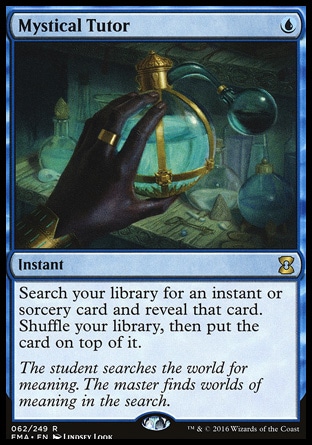
The effect of Mystical Tutor instructs you to find and reveal an instant or sorcery card. This means you are not bound to find one, but if you have, you must reveal it.
Some effects limit the possibility to search libraries for cards:
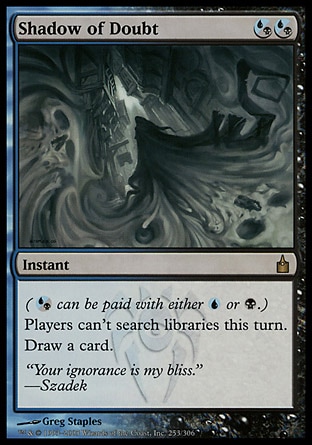
The effect of Shadow of Doubt prohibits searching libraries for the duration of the entire turn in which it resolves. If an effect instructs a player to search a library, that part of the effect must be ignored.
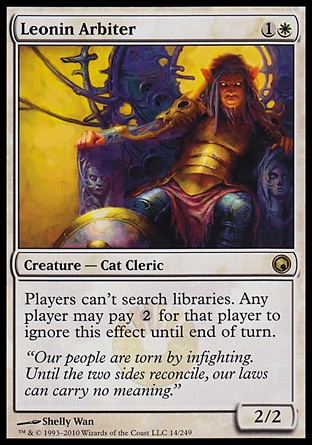
The effect of Leonin Arbiter resembles that of Shadow of Doubt. But if either player pays {2}, the effect ceases for that player until end of turn. You only need to perform this special action once to be able to search as many times as necessary for the duration of the current turn.
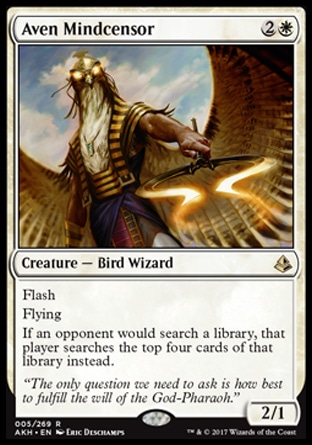
The effect of Aven Mindcensor limits the search possibility for your opponents. Rather than searching their entire libraries, they will look into as little as the top four cards.
Note that the entire library needs to be shuffled thereafter.
Now let’s get back to the subject of this article. The text of Gifts Ungiven spells the following:
Gifts Ungiven is an instant spell, which means you may cast it any time you have priority. This spell is targeted (its text contains the word “target”). It targets an opponent, so you cannot target yourself (even if you despise yourself, you are still not an opponent to yourself) or your teammate, for instance in 2HG. The target is chosen in the process of casting the spell. That target must be legal when choosing it; the legality is checked again as the spell resolves.
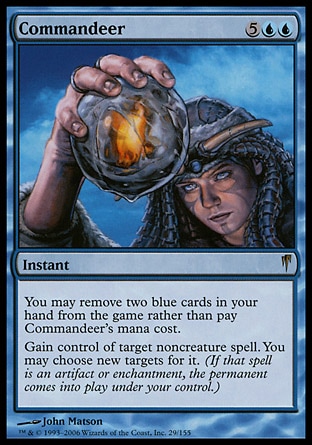
If the cunning yet forgetful opponent snatches control of your Gifts Ungiven and doesn’t change the target, he will get a surprise: Gifts Ungiven will fizzle!
The effect of Gifts Ungiven instructs you to find up to 4 cards in your library (which is a hidden zone). And not just any cards, but rather cards with different names. What are your options?
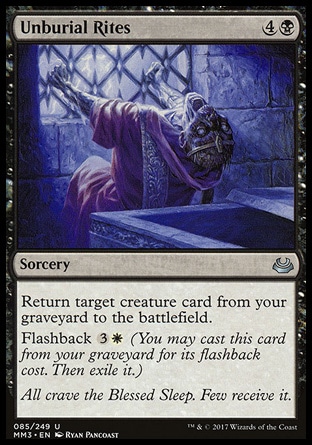
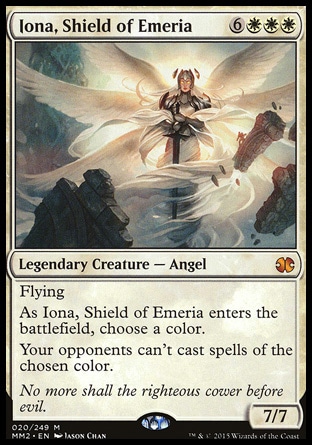
You may choose to not find any cards. If you decide to find multiple cards, they must all have different names. For example, you may find two: Iona, Shield of Emeria and Unburial Rites. The opponent still has to choose exactly two cards, so both of those will hit your graveyard. You then flashback Unburial Rites straight from the graveyard and lock up your opponent’s main color!
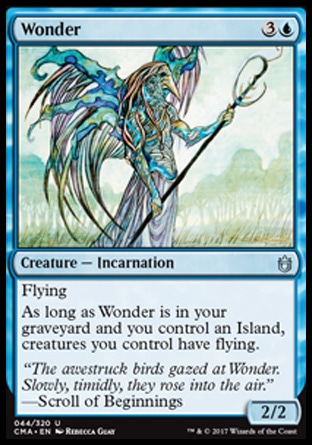
You may find exactly one card, and then it will almost certainly hit the graveyard (Leyline of the Void grins). That has a point with Wonder, you have to agree that it’s nice to grant flying to all of your beatsticks!
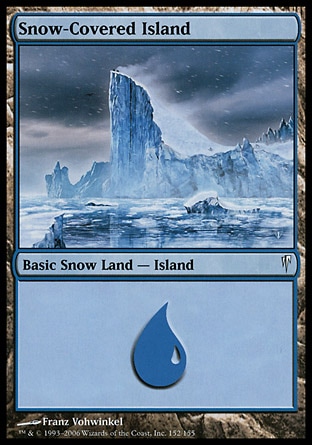
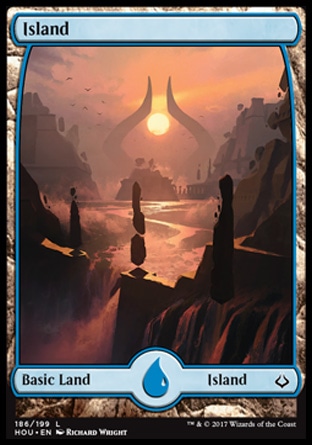
Island and Snow-Covered Island are cards with different names.
You may not find two Turn // Burn.
Finally, the effect of Gifts Ungiven instructs to shuffle the library. No matter if you searched your entire library or only some part of it (for instace being limited by the cunning opponent’s Aven Mindcensor), or even could not search at all (if your cunning opponent cast a Shadow of Doubt that resolved before your Gifts Ungiven), or you could but chose not to find anything, — you have to shuffle your entire library anyways.
- ⇑ Fetchland — slang expression for the cycle of lands from Onslaught block. The cycle was later continued in Zendikar. A fetchland may be sacrificed to search the controller’s library for a land of certain two subtypes and put it directly into play available for use ( Bad River, Wooded Foothills, Arid Mesa etc.). This term is occasionally expanded to include virtually any other land allowing to search a library for another land.
Translated by Witas Spasovski

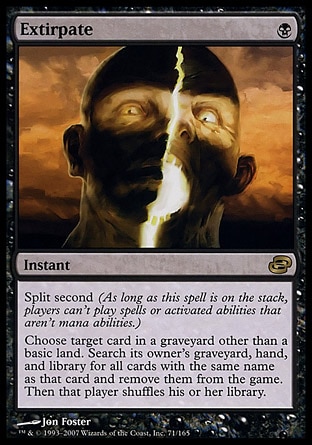
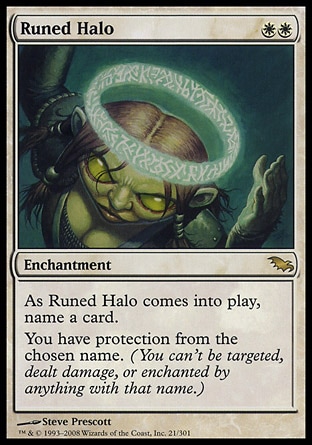
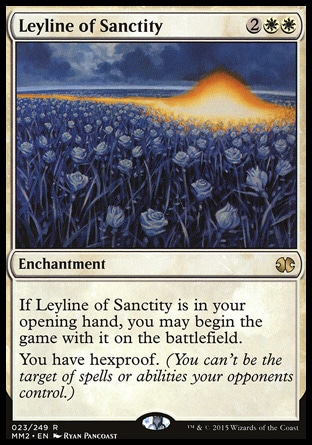
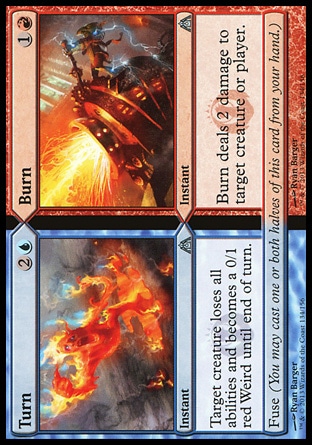
If your only cunning opponent controls Runed Halo with Gifts Ungiven chosen for it, or controls Leyline of Sanctity and/or similar cards, you cannot cast Gifts Ungiven, since you cannot target your opponent with that spell, and you may not target yourself.